Considering the nation’s food safety and health concerns, Hong Kong is planning to ban Japanese seafood from its 10 prefectures. This seismic shift in policy, referred to as the ‘Ban Japanese Seafood’ initiative, is being contemplated as a response to Tokyo’s contentious plan to discharge treated radioactive wastewater from the ill-fated Fukushima nuclear plant into the Pacific Ocean.
The move carries vital implications for Hong Kong’s vibrant culinary scene where Japanese cuisine has carved an indelible niche. Tse Chin-wan, Hong Kong’s Secretary for Environment and Ecology, outlined the potential embargo’s vast scope. It’s not only the fresh or frozen seafood that would be affected, but all products ranging from dried varieties to seaweed and sea salt, elements integral to the city’s over 2,000 Japanese restaurants.
Hong Kong consumed a staggering 75.5 billion yen ($536 million) worth of Japanese seafood in 2022 alone. This consumption level positioned Hong Kong as Japan’s second-largest export market for fishery products, bested only by mainland China.

In a domino effect, Beijing had earlier set the stage with its own embargo on Japanese seafood imports, pointing to health and safety apprehensions. This influx of agitation has echoed through Asia, with nations like South Korea amplifying similar concerns, all despite repeated assurances from Japan and the International Atomic Energy Agency (IAEA) about the minimal impact of the treated wastewater release.
Stressing the seriousness of the issue, Tse Chin-wan cautioned during a news conference, “If there are mistakes or errors, this highly radioactive water could spell massive repercussions for food safety once it enters the ocean’s ecosphere.”
Despite the concerns, the IAEA maintains that the planned release abides by international norms, mirroring strategies employed by nuclear facilities globally, including those in the United States. They propose a plan wherein the treated and heavily diluted contaminated water would be gradually released into the Pacific Ocean over a span of several years.

This procedure, though contentious, is considered critical to fully decommission the Fukushima nuclear plant, a spectre that has loomed over Japan since the devastating earthquake and tsunami-triggered meltdown in 2011.
Hong Kong remains skeptical after a government spokesperson, examining the IAEA report, expressed that the city found “no guarantee” that Japan’s long-term plan and purification system wouldn’t pose potential threats to food safety and marine ecology.
The proposed ban’s ripples would wash over Tokyo, Fukushima, Chiba, Tochigi, Ibaraki, Gumma, Miyagi, Niigata, Nagano and Saitama. Concurrently, the existing restrictions on fruit, dairy products, and meat imports from Fukushima and four adjacent prefectures would persist.

The length of the potential ban is veiled in uncertainty, with Tse offering a cryptic, “Time will tell.”
Prior to the announcement, Hong Kong officials discussed with the Japanese consul general, during which the Japanese delegation urged restraint, advocating decisions be rooted in “scientific facts.”
As the wave of potential radioactive wastewater release swells, it has already sparked a frenzy of salt and seafood hoarding in South Korea. Similarly, in Hong Kong, fears are palpable about a potential rise in prices.
LATEST NEWS | Samunnati Boosts India’s Agri-Exports: 275 Tonnes Grapes to Netherlands



